9 Best Herbal Tinctures For Fungal Infection
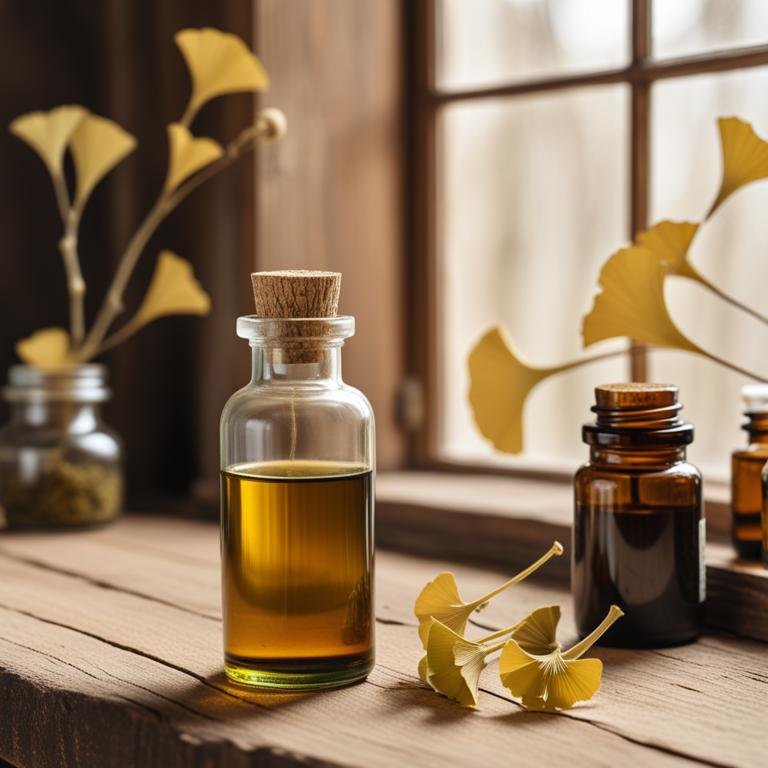
Herbal tinctures for fungal infection are concentrated liquid extracts derived from plants, used to treat various fungal-related ailments such as athlete's foot, ringworm, and candidiasis.
The benefits of using herbal tinctures to treat fungal infections include their natural antibacterial and antifungal properties, which can help reduce symptoms and promote healing without the risk of side effects associated with conventional medications.
Examples of herbal tinctures used to treat fungal infections include Tea Tree oil, which contains melaleuca alternifolia, known for its antifungal properties, and Garlic, which has been used to treat fungal infections due to its sulfur compounds that have antibacterial and antifungal properties.
Additionally, herbal tinctures such as Berberis, Echinacea, and Pau d'arco have also been used to treat fungal infections due to their ability to boost the immune system and fight off fungal infections.
According to "Health science reports", tinctures for fungal infection may be a safe management option as herbal and herbonanoconjugate approaches have been shown to be effective in treating fungal dermatophytic infections while minimizing the risk of adverse effects associated with conventional oral treatments.
Below there's a list of the 9 best herbal tinctures for fungal infection.
- 1. Teucrium chamaedrys tinctures
- 2. Thymus serpyllum tinctures
- 3. Silybum marianum tinctures
- 4. Melaleuca alternifolia tinctures
- 5. Artemisia absinthium tinctures
- 6. Echinacea purpurea tinctures
- 7. Cymbopogon citratus tinctures
- 8. Echinacea angustifolia tinctures
- 9. Ginkgo biloba tinctures
Also you may be interested in...
TODAY'S FREE BOUNDLE
Herb Drying Checklist + Herbal Tea Shopping List + Medicinal Herbs Flashcards
Enter you best email address below to receive this bundle (3 product valued $19.95) for FREE + exclusive access to The Aphotecary Letter.
$19.95 -> $0.00
1. Teucrium chamaedrys tinctures
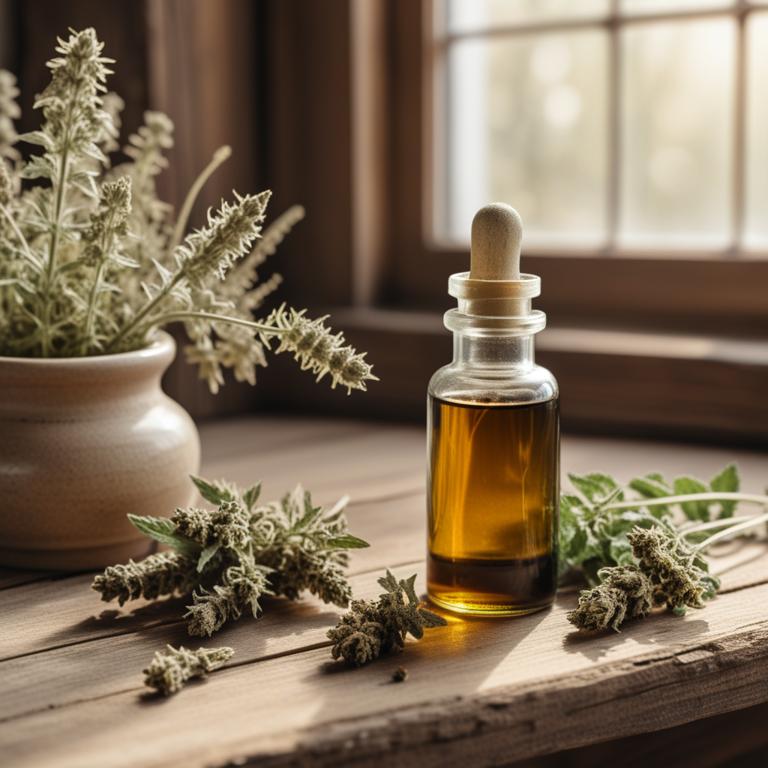
Teucrium chamaedrys tinctures have been traditionally used to treat fungal infections due to their antifungal and antimicrobial properties.
This herbal preparation helps to treat fungal infections by inhibiting the growth of pathogens and promoting a healthy balance of microorganisms in the body.
The bioactive constituents of Teucrium chamaedrys, including flavonoids, phenolic acids, and terpenoids, contribute to its antifungal activity by disrupting the cell membranes of fungal cells and inhibiting the synthesis of fungal cell walls.
The benefits of using Teucrium chamaedrys tinctures to treat fungal infections include reduced symptoms, improved wound healing, and enhanced immune function.
2. Thymus serpyllum tinctures
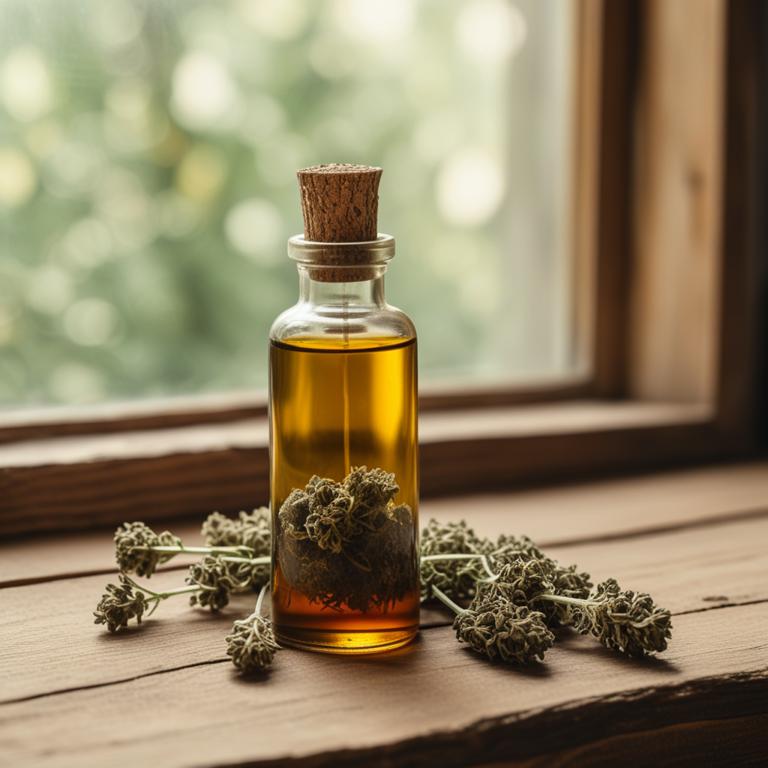
Thymus serpyllum tinctures, derived from the common thyme plant, have been traditionally used to treat fungal infections due to their antimicrobial and antifungal properties.
The bioactive constituents present in this herbal preparation, such as thymol and carvacrol, help to inhibit the growth of fungi, thereby reducing the severity of the infection.
By creating an environment that is less conducive to fungal growth, Thymus serpyllum tinctures can effectively treat fungal infections, including those caused by Candida and other fungal pathogens.
The benefits of using Thymus serpyllum tinctures to treat fungal infections include their natural origin, minimal side effects, and ability to promote a healthy balance of the gut microbiome.
Related Study
According to "BMC complementary and alternative medicine", Thymus serpyllum tinctures, specifically the red oil of Thymus serpyllum, demonstrated a good activity against Candida spp., including fluconazole/voriconazole resistant strains, with a minimum inhibitory concentration (MIC) of ≤0.0038 %, v/v for C.albicans and C.tropicalis, and 0.0078- < 0.015 %, v/v for C.glabrata.
3. Silybum marianum tinctures
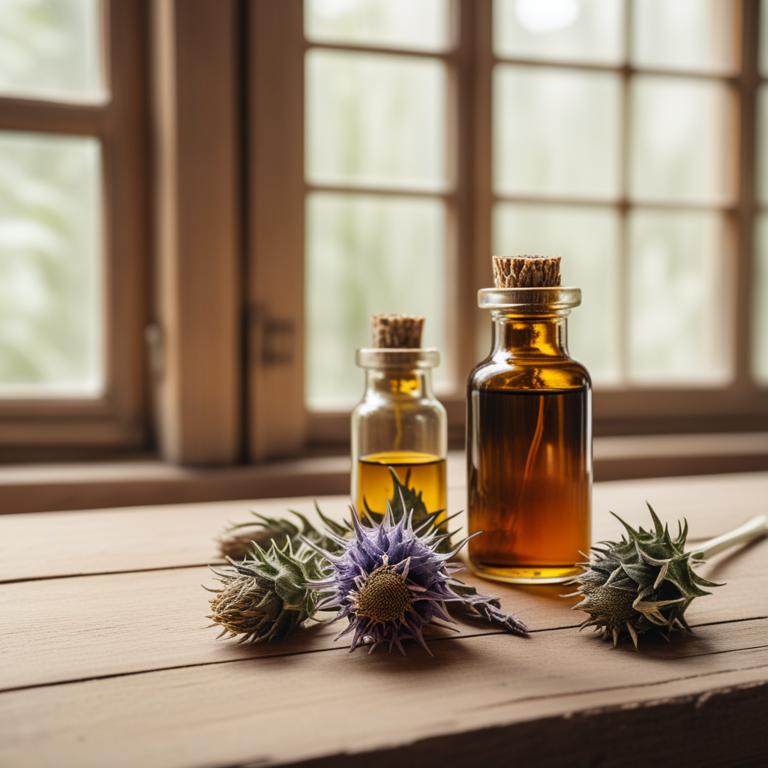
Silybum marianum tinctures have been traditionally used to treat fungal infections, particularly those caused by Candida and other pathogenic microorganisms.
The properties of this herbal preparation, such as its antifungal and antimicrobial properties, help to inhibit the growth and proliferation of fungal pathogens, thereby alleviating symptoms of the infection.
The bioactive constituents of Silybum marianum tinctures, including flavonoids, silymarin, and other polyphenolic compounds, contribute to its antifungal activity by disrupting the cell membrane of fungal cells and preventing them from reproducing.
By using Silybum marianum tinctures, individuals can benefit from its ability to reduce inflammation, promote wound healing, and restore the balance of the gut microbiome, ultimately leading to a reduction in fungal infection symptoms.
Related Study
According to "Journal de pharmacie de Belgique", Silybum marianum tinctures, specifically silymarine, have been shown to have preventive and curative activity against fungal infections, specifically Amanita phalloides, which causes liver damage.
4. Melaleuca alternifolia tinctures
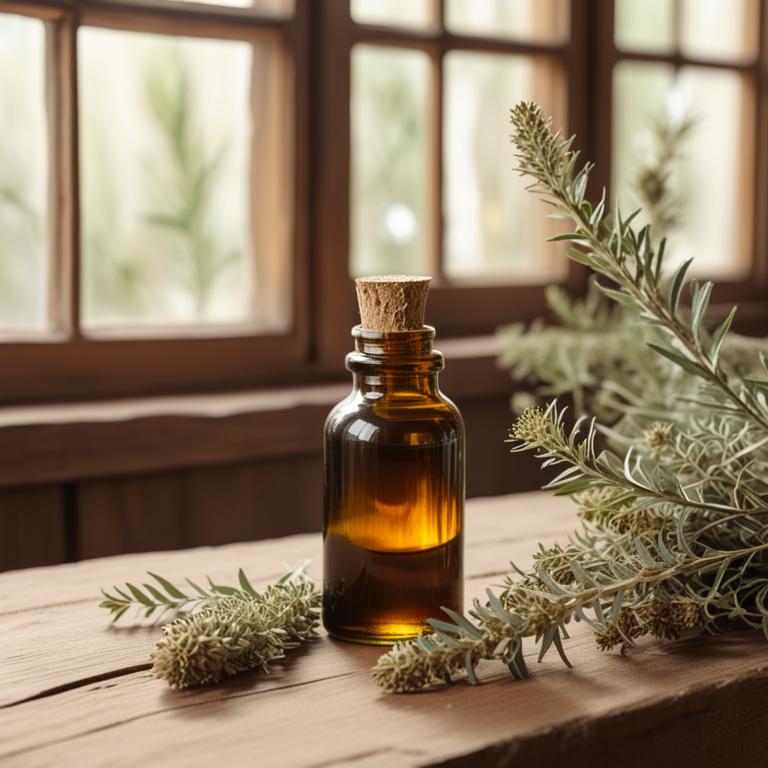
Melaleuca alternifolia tinctures have been used to treat fungal infections, such as athlete's foot and ringworm, due to their antimicrobial and antifungal properties.
The bioactive constituents of Melaleuca alternifolia, including cineole and terpinen-4-ol, help to inhibit the growth of fungi and reduce inflammation, thereby treating fungal infections.
These constituents work by disrupting the cell membranes of fungal cells and preventing the production of fungal enzymes, ultimately leading to the elimination of the infection.
The benefits of using Melaleuca alternifolia tinctures to treat fungal infections include reduced symptoms, faster healing times, and improved overall health.
Related Study
According to "Skin pharmacology : the official journal of the Skin Pharmacology Society", Melaleuca alternifolia tinctures for fungal infection have shown effective antifungal activity against various strains of fungi, including dermatophytes, Candida albicans, and Malassezia furfur, with minimum inhibitory concentrations (MIC) of tea tree oil ranging from 556.2 to 4,450.0 micrograms/ml.
5. Artemisia absinthium tinctures
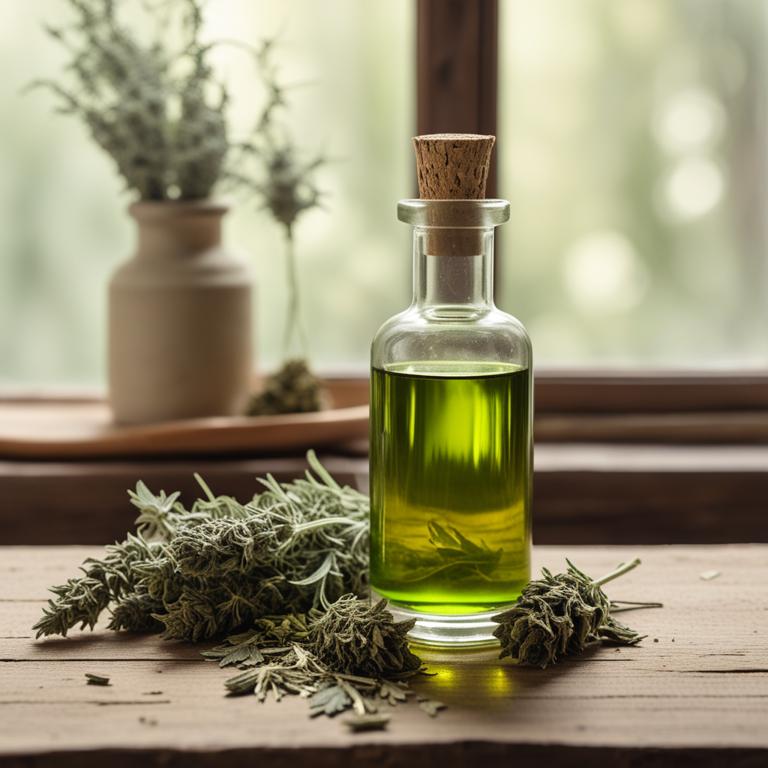
Artemisia absinthium tinctures have been traditionally used to treat various ailments, including fungal infections, due to their antimicrobial and antifungal properties.
The bioactive constituents of Artemisia absinthium, such as thujone, borneol, and camphor, help to inhibit the growth of fungal pathogens and reduce inflammation.
This herbal preparation is beneficial in treating fungal infections by promoting a healthy environment for the growth of beneficial microorganisms and reducing the severity of symptoms.
Regular use of Artemisia absinthium tinctures may help to alleviate fungal infections, promote healing, and prevent future occurrences.
6. Echinacea purpurea tinctures

Echinacea purpurea tinctures have been traditionally used to treat fungal infections, such as candidiasis and athlete's foot, due to their antifungal and antimicrobial properties.
The bioactive constituents, including alkylamides, phenolic acids, and glycosides, help to inhibit the growth of fungi, thereby reducing the severity of the infection.
Echinacea purpurea tinctures also possess anti-inflammatory properties, which aid in reducing the discomfort and pain associated with fungal infections, promoting a faster recovery.
The benefits of using Echinacea purpurea tinctures to treat fungal infections include their non-invasive nature, ease of administration, and potential to reduce the reliance on conventional antifungal medications.
7. Cymbopogon citratus tinctures
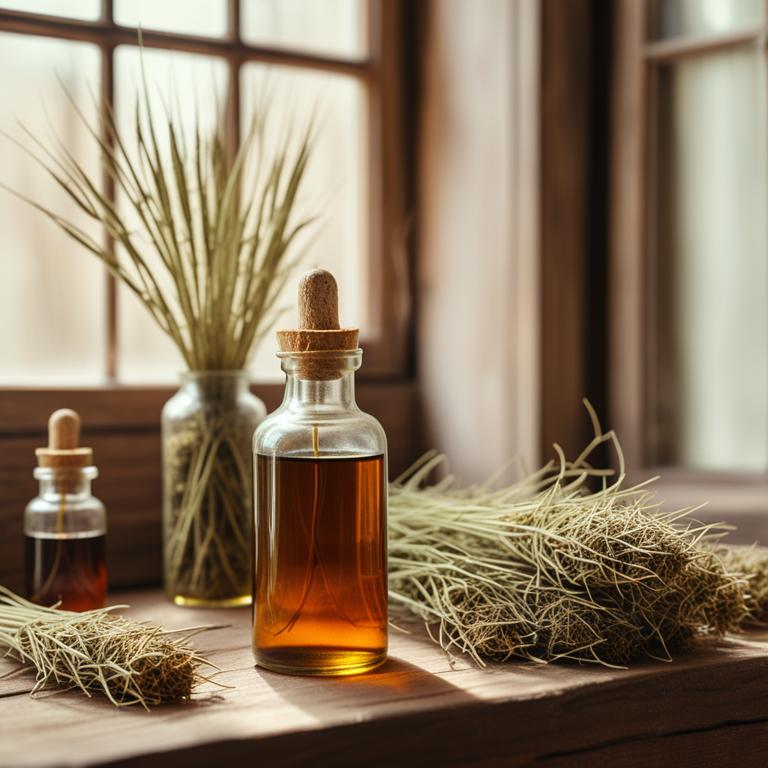
Cymbopogon citratus tinctures, derived from the leaves of the lemongrass plant, have been traditionally used to treat fungal infections due to its antimicrobial and antifungal properties.
The bioactive constituents present in these tinctures, including citral, limonene, and geraniol, help to inhibit the growth of fungi and bacteria, thereby aiding in the treatment of fungal infections.
The benefits of using Cymbopogon citratus tinctures to treat fungal infections include its ability to promote healing, reduce inflammation, and prevent the spread of infection.
By utilizing the antifungal properties of Cymbopogon citratus tinctures, individuals can effectively manage and treat fungal infections, promoting overall health and well-being.
Related Study
According to "Antibiotics (Basel, Switzerland)", Cymbopogon citratus tinctures may be effective against fungal infections due to their antifungal properties, with MIC values ranging from 1.25 to 20 µL/mL against Candida spp. and Malassezia furfur.
8. Echinacea angustifolia tinctures
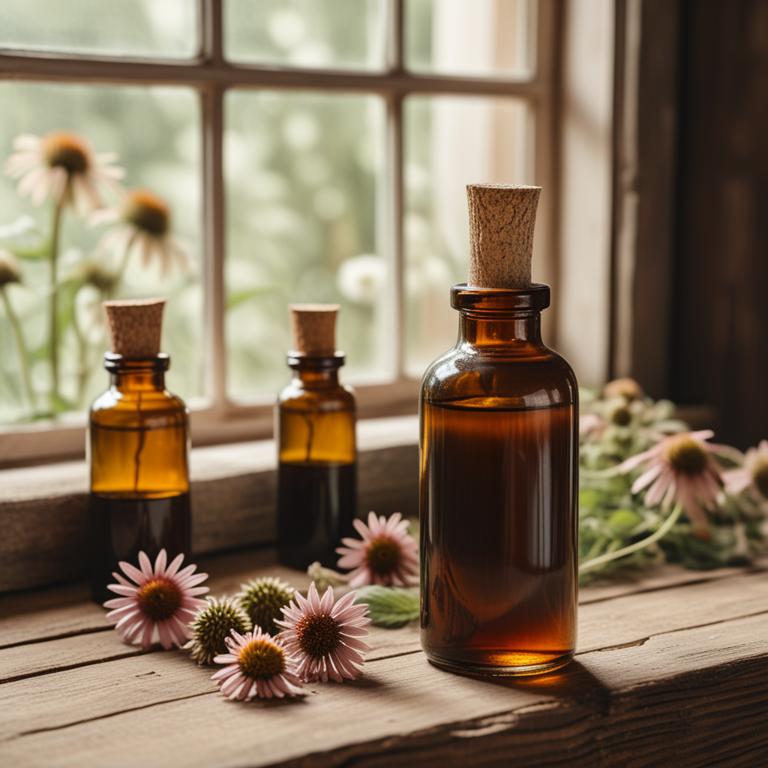
Echinacea angustifolia tinctures have been traditionally used to treat fungal infections, such as athlete's foot and ringworm, due to their antifungal and antimicrobial properties.
The bioactive constituents, including alkylamides, glycosides, and phenolic acids, in Echinacea angustifolia tinctures help to inhibit the growth of fungal pathogens and promote a healthy balance of microorganisms on the skin.
By reducing inflammation and promoting wound healing, Echinacea angustifolia tinctures can help to alleviate symptoms associated with fungal infections, including itching, redness, and scaling.
The benefits of using Echinacea angustifolia tinctures to treat fungal infections include a reduction in the risk of complications, improved wound healing, and enhanced overall immune function.
9. Ginkgo biloba tinctures

Ginkgo biloba tinctures have been used to treat fungal infections, particularly those caused by Candida albicans, due to their anti-fungal and anti-inflammatory properties.
The bioactive constituents of Ginkgo biloba tinctures, such as bilobalide and ginkgolides, have been shown to inhibit the growth of fungi and reduce inflammation in the affected area.
By using Ginkgo biloba tinctures, individuals can help to alleviate symptoms of fungal infections, including itching, redness, and discharge, and promote a healthy balance of the gut microbiome.
The benefits of using Ginkgo biloba tinctures to treat fungal infections include reduced risk of antibiotic resistance, fewer side effects compared to conventional treatments, and improved overall immune function.